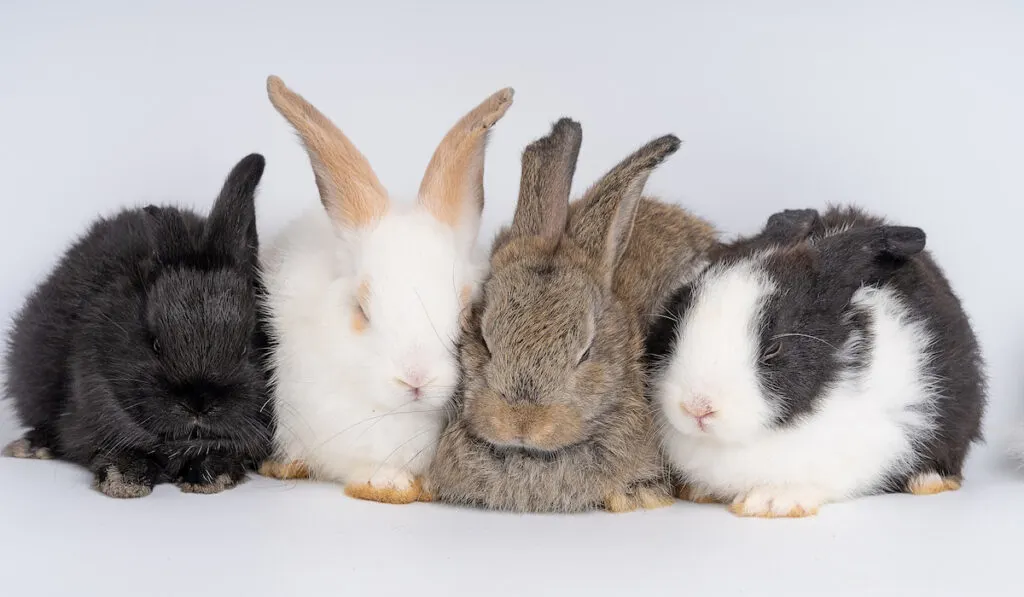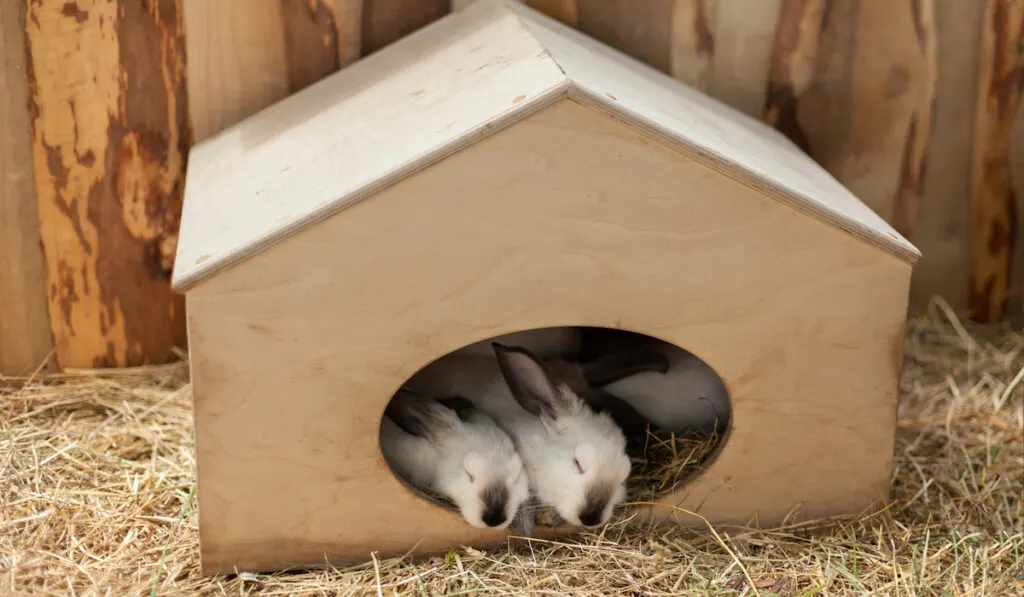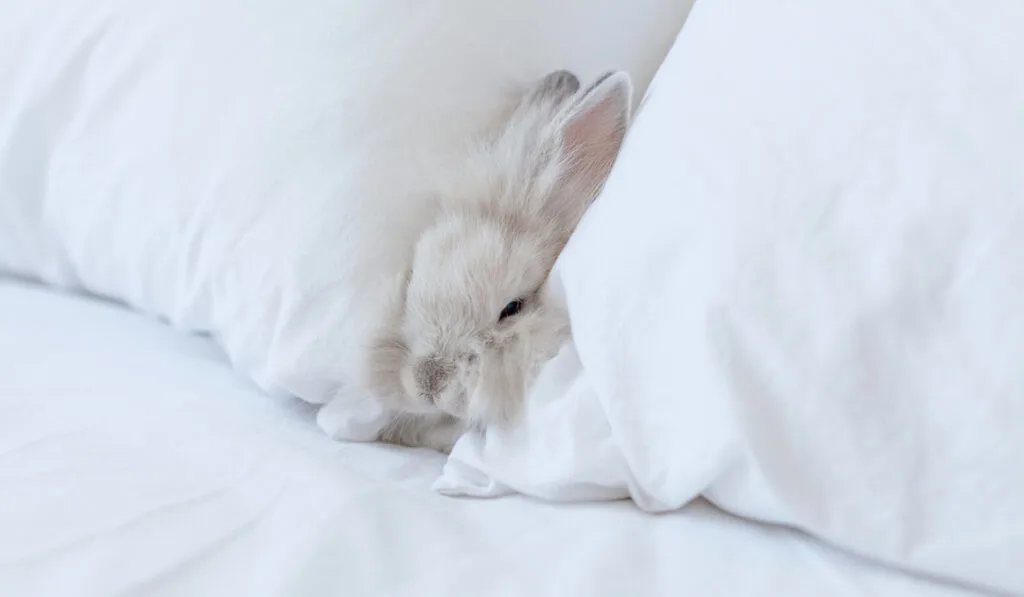If you’re new to owning a rabbit, you’re sure to notice some quirks about your new pet’s sleeping habits. It is pretty common for a new rabbit owner to wonder whether their rabbit is sleeping at all because it always seems to be awake.
So do rabbits sleep? Yes, rabbits sleep. In fact, rabbits sleep up to 11 hours per day during daylight hours and in the late night. They are most often awake during dawn and dusk, and they tend to take short naps instead of sleeping in one long chunk.

If you’ve still got questions about the sleeping habits of your rabbit, don’t worry. In this article, we will go over everything you need to know about your rabbit and its sleep.
Table of Contents
Rabbit Sleep Cycles
All animals need sleep, and rabbits are no different. It may not appear that your bunny is sleeping because, as a prey animal, they are on high alert at all times. If they hear you approaching their hutch, they will wake up instantly and be ready for escape until they realize that they’re safe.
Rabbits typically sleep throughout the day and during the late night. They are crepuscular animals, which means they are awake and active at dawn and dusk, and they sleep most of the day during short periods.
Adding to the confusion is the fact that some rabbits sleep with their eyes open. As we said, they’re always on high alert. This helps keep them alive in the wild, but as a pet, it can be annoying for the owner who is concerned that their rabbit isn’t getting enough rest.

How Much do Rabbits Sleep?
According to a study found in Behavior and Neural Biology, rabbits sleep about 11 hours in a 24 hour period (source). That is nearly half of their lives!
Your rabbit might sleep slightly less as many pet owners report that they’re rabbits sleep about 8 hours a day.
How Do You Know if a Rabbit is Sleeping?
So if your rabbit sleeps with its eyes open and may wake up at the slightest noise, how do you know if they’re sleeping or not?
- Ears are down and relaxed. After you get to know your rabbit, you’ll get used to what its ears look like when it is awake. When you’re rabbit is sleeping, you’ll notice that the ears are laid flat and are relaxed. It might take some practice, but eventually, you’ll be able to tell if your rabbit is sleeping just by the ears alone.
- No nose wiggles or twitches. When your rabbit is awake, you probably notice a lot of movement by its nose. When your rabbit is asleep, the nose wiggles will relax.
- Takes up the bunny loaf position. The bunny loaf is a common position for rabbits to take when they are relaxing and when they are sleeping. Their legs are tucked under them, their head is down, and their ears are relaxed so that they look like a little loaf of bread.
- Lays with legs out on its side. Some bunnies will sleep on their side with their legs out to the side. (Kind of like a dog). But position alone cannot tell you whether a rabbit is sleeping.
- Twitches when dreaming. You know how a dog might move its legs or flinch during a dream? Well, some bunnies do this too!
- Breathing will slow. Just like us humans, rabbits’ breathing will slow down while it is asleep.
If you’re new to owning a rabbit, don’t worry. The more comfortable your rabbit gets with you and the more familiar you get with your rabbit, the easier it will become to identify a sleeping bunny.

How Long Should a Rabbit Sleep?
Rabbits tend to be what we would consider nappers. They don’t usually sleep for 8 hours straight. They may sleep for 4 hours at a clip and then take shorter naps on and off throughout the day or night.
If your rabbit is sleeping excessively, you should look for other signs that your rabbit could be ill. Is your rabbit eating normally? Active when awake? Alert? If not, you should take your rabbit to the vet for an exam to be sure it is healthy.
How do Rabbits Sleep in the Wild?
In the wild, rabbits live in underground burrows and tunnels that are interconnected with multiple entrances and exits. These are called warrens and offer them protection while they sleep.
Rabbits in warrens sleep in groups (imagine a rabbit cuddle puddle). This helps protect them further because if one rabbit wakes up because of a predator, so will the others. It also means if a predator catches one rabbit, the others can still escape.

How to Help Your Rabbit Sleep
To help your rabbit sleep, you aren’t going to need to start digging out your own warren, but there are some things you can do to help your rabbit sleep easier.
- Let it sleep in a hutch. Hutches feel safer to a rabbit than a cage since it is more closed off. It is also darker than a cage, which gives it a warren-like feel.
- Introduce a friend. If you can, it is good to let a rabbit have a friend. This will give them comfort while they are sleeping, but it will also increase their happiness in other aspects of their life. In the wild, rabbits would be a part of a large community.
- Don’t annoy it. If your rabbit is sleeping, leave it alone. Rabbits wake very easily, especially when they already don’t feel safe. Once your rabbit is used to you and your home, it will fall into a deeper sleep. In the meantime, if it isn’t dawn or dusk, try to give your rabbit the space and quiet it needs to sleep.
- Test different beds. This will vary from rabbit to rabbit, but generally, rabbits like to sleep in a cozy, soft, little nook. A shallow basket lined with something fluffy usually does the trick. Although plenty of rabbits enjoy just sprawling out on the carpet and passing out.
Rabbits don’t need it to be dark in order to sleep. Even though it would be dark in their warren in the wild, they can sleep just fine in daylight, but making it dark doesn’t hurt, and certainly don’t mimic crepuscular conditions.
Can Rabbits Sleep In Beds?

While some rabbit owners claim their rabbits enjoy sleeping with them, it is unlikely that your rabbit will want to.
Why your bunny doesn’t want to sleep with you:
- Because rabbits are crepuscular, it is unlikely that they will want to sleep when you want to sleep. It is better for you and bunny to have your own space in this case.
- Rabbits also like to be in enclosed spaces. They are more likely to want to sleep under your bed than on it.
- It might not be able to get into and out of your bed easily or safely.
Why you don’t want to sleep with your rabbit:
- Your rabbit might use your bed (or you) as a bathroom.
- You could hurt it if you roll on to it while it is sleep (and it could nip you).
- Your rabbit could fall out of the bed.
- It might wake you up early to be fed.
By now, you should be able to tell if your bunny is sleeping or not and know what to do to help him or her sleep comfortably. If it seems like your bunny is never sleeping, don’t stress it. It is sleeping, but it is difficult to tell!
